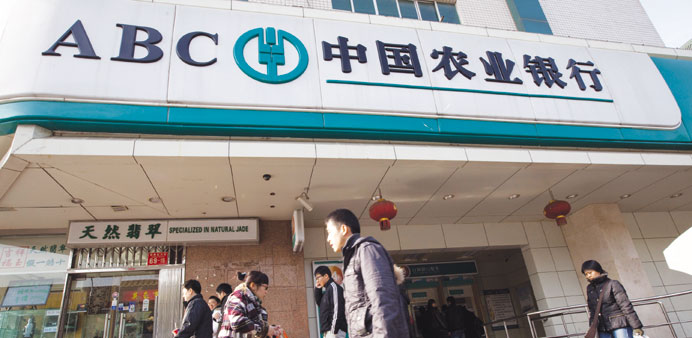Pedestrians walk past a branch of Agricultural Bank of China in Beijing. Chinese banks are poised to raise a record $120bn in the next two years to shore up their balance sheets.
Chinese banks are poised to raise a record $120bn in the next two years to shore up their balance sheets in the face of slowing growth and rising bad debts, but the funds could prove expensive and hurt earnings as investors demand a premium.
For the first time, banks will raise capital by issuing preference shares and other so-called hybrid securities, a funding technique that avoids the need for issuing ordinary shares into a badly hit stock market.
Just in the past two weeks, Agricultural Bank of China and Bank of China announced plans to raise about $29bn in preferred shares between them.
As growth slows and bad debts build up, the banks are rushing to replenish their balance sheets to meet new global capital rules known as Basel III. The Chinese government has been rigorously enforcing these regulations in its efforts to ward off a financial crisis following a huge run-up in debt since 2008 and a marked slowdown in the economy.
Analysts say the flood of regulatory capital will help investors diversify their portfolio, but they are expected to drive a hard bargain given the concerns about transparency in China’s opaque financial system and the worrying rise of toxic debt in recent years.
“Given the size of the proposed capital issues and the concerns about transparency in the Chinese banking system, it may be hard to price aggressively versus the western structures currently out there,” said Ivan Vatchkov, chief investment officer of Algebris Investments (Asia). The first few deals should give banks an idea of returns that investors will demand on hybrid capital securities.
China CITIC Bank International, a Hong Kong-based affiliate of China CITIC Bank, in April sold capital securities in the offshore market at an interest rate about 100 basis points over the same bank’s subordinate bonds.
Benchmark five-year subordinate debt from China’s top-rated banks currently trades at a yield of 5.25%, suggesting banks will have to price yields at around 6.3% for preferred shares to lure investors – a side effect of an economy growing at its slowest pace in decades.
Some analysts warn that forcing banks to pay hefty yields on new hybrid capital instruments would not only pressure their profitability, but also threaten their ability to continue lending aggressively as bad loans rise in a slowing economy. Chinese banks’ non-performing loan figures rose to a two-year high at the end of 2013, according to official data. However, the risk that investors may lose their money in a potential banking collapse is slim as many of the state firms have an implicit government guarantee – a back-stop that is similar to a deposit guarantee scheme, which China is planning to introduce later this year in line with a market reform drive.
Total assets of China’s banking industry reached around $24tn at the end of 2013, according to the China Banking Regulatory Commission – at more than twice the size of the country’s economy it shows why investors are confident the government will prevent a Greek-type debt crisis from ever emerging.
China’s big four lenders enjoy the equivalent of single-A ratings from credit ratings agencies such as Standard & Poor’s and can fund relatively cheaply in the straight bond markets.
Investors in preference shares, however, demand a premium for the added risk that they may see their holdings converted into common equity if the bank’s capital ratio falls below the trigger level.
“A price discovery process has to take place for first time issues. Those investors who have more conservative investment policies might also adopt a more cautious stance towards such instruments,” said Angus Hui, fund manager at Schroders Investment Management.
In April, China unveiled rules on commercial bank issuance of preferred shares, paving the way for lenders to begin fundraising designed to enable them to withstand an expected rise in bad loans.

